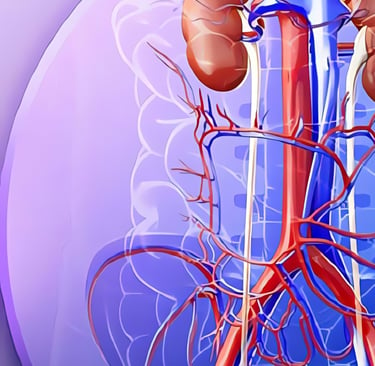Modern methods of diagnostics and treatment in urology
4/22/20252 min read


Urologists at the KAF center are doctors who diagnose, treat and prevent diseases of the genitourinary system, pathological processes of the retroperitoneal organs (disorders of the ureters, bladder, kidneys).
A urologist also performs surgical interventions that can be aimed at eliminating various pathologies, congenital and acquired defects of the genitourinary system.
Get a quality consultation with a urologist at the KAF. Our sensitive specialists work according to modern evidence-based protocols, perform a full range of minor surgical and classical surgical interventions.
In their work, they are guided by the credo: The patient's welfare is the highest law for a doctor.
That is why you will be met by a team of experienced, friendly like-minded people who are trying to improve the quality of life of patients and share a positive mood with them.
You can be sure that you will receive qualified premium-class medical care.
When to consult a urologist
A man needs to consult a urologist in case of:
urination disorder;
pain in the perineum, lumbar and suprapubic areas;
sexual dysfunction;
genitourinary infections;
growths on the genitals;
urolithiasis;
urinary incontinence;
acute conditions (renal colic, acute urinary retention, etc.)
Using modern minimally invasive methods, urologists of the KAF conduct high-quality diagnostics and treatment of the entire spectrum of urological pathologies and infertility.


When is a woman required to consult a urologist?
inflammation of the external and internal genital organs;
bladder and urethra infections;
inflammation of the kidneys;
urolithiasis;
cystitis;
pyelonephritis;
urinary incontinence;
STIs (chlamydia, trichomoniasis, genital herpes, etc.).
Symptoms that require a urologist consultation
urination disorders, frequent urges, pain, burning, stinging, etc.;
sharp or aching pain in the lower back;
changes in urine parameters (pungent odor, presence of blood, pus, mucus and other impurities, change in volume and color);
appearance of urethral or vaginal discharge, which may be bloody, purulent or mucous;
decreased sexual desire;
female, male infertility;
sexual disorders; pain during sexual intercourse; change in color and smell of sperm;
external changes in the external genitalia in men: redness, itching, swelling, etc.;
urinary incontinence in women.
How to undergo a urologist consultation
During the consultation, the urologist conducts:
examination of the patient;
questioning the patient about the history of the disease and complaints about the state of health;
drawing up a treatment plan;
if necessary, prescribes additional studies and tests.


What diseases does a urologist treat?
phimosis;
cystitis;
urethritis;
prostatitis;
pyelonephritis;
testicular disease;
prostate adenoma;
urolithiasis;
erectile dysfunction;
bladder pathologies;
sexually transmitted infections, etc.
Diagnosis of urological diseases
High-quality diagnostics are the key to the effectiveness of the prescribed treatment. Before drawing up an examination plan, during the consultation, the urologist collects an anamnesis of the disease (when it started, how it was treated), asks clarifying questions.
The following laboratory and instrumental studies are used in the diagnosis of urological diseases:
general urine analysis;
urine analysis according to Nechiporenko;
bacteriological urine culture;
general and biochemical blood tests;
taking a urogenital smear;
smear from the urethra;
spermogram;
prostate secretion analysis;
urethroscopy;
ultrasound (urethra, prostate, testicles, kidneys, bladder, ureters, pelvic organs;
CT;
MRI.
Clinic
Modern medical services for the whole family.
coll us
Quality
© 2025. All rights reserved.
+380677886657
+380932993555